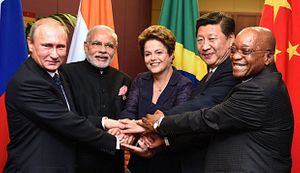Last year, new institutions popped up in both the global finance and security arenas, courtesy of China. First, driven by Beijing, the $100 billion New Development Bank (NDB), a mini-World Bank sponsored by the five BRICS economies – Brazil, Russia, India, China, and South Africa – was formed during July 2014. Then, at the APEC meeting in Beijing, that October, Chinese President Xi Jinping unveiled the regional Asian Infrastructural Investment Bank (AIIB), a body comprising more than 20 founding members. Finally, just one month later, a $40 billion Silk Road Fund (SRF) was announced to restore the centuries-old Silk Road trading route and to promote economic integration from Asia to the Mediterranean. These ambitious projects, widely interpreted as rivaling the U.S.-dominated global financial institutions, including the regional Asian Development Bank, will undoubtedly bolster Chinese influence in the region.
On the security front, China revived an existing inter-governmental forum, proposed first by Kazakhstan’s president in 1992. The Conference on Interaction and Confidence-Building Measures in Asia (CICA), as it is called, held its fourth meeting during May 2014. With China holding the Chair through 2016, a regional security cooperation architecture emerged. CICA promotes a new concept, calling for a “common, comprehensive, cooperative and sustainable security.” The new CICA, along with the Shanghai Cooperation Organization (SCO), represent China-led security organizations. Most recently, Beijing announced that a Cross-border Interbank Payment System (CIPS) would be instituted late this year. First proclaimed by the People’s Bank of China (PBOC) in April 2012, this initiative would provide a mechanism for transferring funds without having to use the U.S. banking system, or the U.S. dollar. This is a potential game change for international finance. Some observers believe the scheme has economic security implications as well.
Why were these initiatives announced at such short intervals? While these Sino-organized institutions offer an alternative for Western financial institutions, they also represent China’s frustration with current global economic governance. The U.S. Congress has veto power over any reforms to these institutions. China, and perhaps others, believes there needs to be a fair and well-represented system. In addition, the current governance structure stubbornly refuses to reflect Beijing’s new status as the second largest global economy. China does not have much input into major decisions, whether at the World Bank, the IMF, or the Japan- and U.S.-dominated Asian Development Bank. Recall the frustration reflected in IMF Director Christine Lagarde’s offer of “a belly dance” in return for Washington’s approval of long-stalled reform in the IMF. These reforms could have moderately improved China’s standing and engagement in the body.
What emboldened China to suddenly challenge existing institutions dominated by the United States? Perhaps the impetus arises from Mao’s teaching of lingqi luzao strategy. In 1949, against the backdrop of the “century of humiliation,” Mao Zedong issued this famous principle. It was a paradigm shift, designed to prevent Western countries from their privileges specified in those “unequal treaties.” From the onset of the Opium War, the Western nations, in concert with Russia and Japan, imposed on China several hundred treaties granting themselves economic, political, and cultural rights in the Middle Kingdom. Mao applied that local wisdom of lingqi luzao (literally “build a new stove”) for redress. Just as a new stove solves problems with an old one no longer fit for its purpose, the PRC would now initiate diplomatic relations in a new fashion. Abandoning the treaty system that had subjugated his nation, relations would be established on a more equal footing. In short, if the financial rules run against your interests, build your own institutions.
Unfortunately, from Washington’s perspective, these new China-led institutions are welcomed by Asian countries, judging from their memberships. Even America’s closest ally, Great Britain, has decided to join the AIIB as a founding member. This may serve as a wakeup call for Washington to accelerate the necessary reforms in the IMF and World Bank to better reflect a changed world.
Dr. Chunjuan Nancy Wei, currently a Fulbright Scholar in Taiwan, teaches in the M.A. East Asian & Pacific Rim Studies and the B.A. International Political Economy & Diplomacy programs at the University of Bridgeport in Connecticut. She has published on the South China Sea disputes, U.S.-China relations, East Asian political economy, and cross-Taiwan Strait politics in such journals as the Harvard Asia Quarterly, Yale Journal of International Affairs, and the Southeast Review of Asian Studies.

































